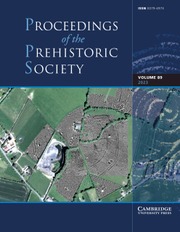No CrossRef data available.
Article contents
The Face on the Turoe Stone
Published online by Cambridge University Press: 18 August 2022
Abstract
Re-examination of the Turoe stone, Co. Galway, Ireland, a small granite pillar decorated with Celtic art, has revealed a possible, previously un-noticed, stylised boar’s head.
Résumé
Le visage sur la Turoe Stone, de Jennifer Foster et Magdaen Batten
Un ré-examen de la Turoe Stone, Co. Galway, Irlande, une petite colonne de granit décorée d’art celtique, a révélé une éventuelle tête de sanglier stylisée auparavant inaperçue.
Zusammenfassung
Das Gesicht auf dem Turoe Stone, von Jennifer Foster und Magdalen Batten
Eine erneute Untersuchung des Turoe Stone, Co. Galway, Irland, einer kleinen Granitsäule, die mit keltischer Kunst verziert ist, hat einen möglichen, zuvor unbemerkten, stilisierten Eberkopf ergeben.
Resumen
El Rostro en la Piedra Turoe, por Jennifer Foster y Magdalen Batten
Un nuevo examen de Turoe Stone, Co. Galway, Irlanda, una pequeña columna de granito decorada con arte celta, ha revelado una posible cabeza de jabalí estilizada previamente desapercibida.
- Type
- Research Article
- Information
- Copyright
- © The Author(s), 2022. Published by Cambridge University Press on behalf of The Prehistoric Society


